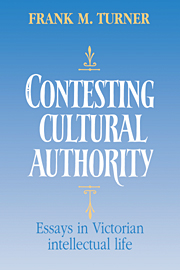Book contents
- Frontmatter
- Contents
- Preface
- I SHIFTING BOUNDARIES
- 1 The religious and the secular in Victorian Britain
- 2 Cultural apostasy and the foundations of Victorian intellectual life
- 3 The crisis of faith and the faith that was lost
- 4 The secularization of the social vision of British natural theology
- II SCIENCE AND THE WIDER CULTURE
- III MODERNS AND ANCIENTS
- Index
3 - The crisis of faith and the faith that was lost
Published online by Cambridge University Press: 22 September 2009
- Frontmatter
- Contents
- Preface
- I SHIFTING BOUNDARIES
- 1 The religious and the secular in Victorian Britain
- 2 Cultural apostasy and the foundations of Victorian intellectual life
- 3 The crisis of faith and the faith that was lost
- 4 The secularization of the social vision of British natural theology
- II SCIENCE AND THE WIDER CULTURE
- III MODERNS AND ANCIENTS
- Index
Summary
A more familiar feature of Victorian intellectual life than the cultural apostasy of Anglicans turning against their cultural setting are the cases of individuals who experienced a loss of faith in Christianity. In the past scholars have generally regarded the situations involving such Christian faith in crisis as primarily an intellectual experience. They have tended to point to works of dissolvent literature associated with Enlightenment rationalism, the higher criticism of the Bible, or new theories of physical science as the chief causes for particular persons modifying or rejecting the faith of their childhoods. The nineteenth-century documents recording the loss of faith experience in no small measure themselves led to that conclusion. In their autobiographies Victorian doubters and unbelievers often recalled the impact of advanced works of science, biblical criticism, or history upon their religious thought and then recounted the manner in which those new ideas had led them to renounce major Christian doctrines, to stop attending church, to change denominations, to leave the Christian ministry, or to embrace atheism, agnosticism, or some other substitute for traditional Christianity. Many of the loss of faith novels, such as The autobiography of Mark Rutherford (1881) and Robert Elsmere (1888), embodied this same scenario.
- Type
- Chapter
- Information
- Contesting Cultural AuthorityEssays in Victorian Intellectual Life, pp. 73 - 100Publisher: Cambridge University PressPrint publication year: 1993



